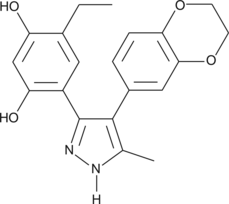Chemicals
Showing 13801–13950 of 41137 results
-
CC-223 is a potent inhibitor of mTOR (IC50 = 16 nM) that shows selectivity for mTOR over a panel of 246 other kinases.{33446} It blocks signaling through both mTORC1 and mTORC2, inhibiting the phosphorylation of S6RP, 4EBP1, and Akt(S473) in cellular systems.{33446} CC-223 inhibits growth and induces apoptosis in hematologic and solid tumor cell lines in vitro, and it exhibits dose-dependent tumor growth inhibition in multiple solid tumor xenografts in vivo.{33446}
Brand:CaymanSKU:19917 -Available on backorder
CC-223 is a potent inhibitor of mTOR (IC50 = 16 nM) that shows selectivity for mTOR over a panel of 246 other kinases.{33446} It blocks signaling through both mTORC1 and mTORC2, inhibiting the phosphorylation of S6RP, 4EBP1, and Akt(S473) in cellular systems.{33446} CC-223 inhibits growth and induces apoptosis in hematologic and solid tumor cell lines in vitro, and it exhibits dose-dependent tumor growth inhibition in multiple solid tumor xenografts in vivo.{33446}
Brand:CaymanSKU:19917 -Available on backorder
c-Jun N-terminal kinases (JNKs) are MAP kinase family members that become highly activated after cells are exposed to stress conditions and are poorly activated by exposure to growth factors or mitogens.{17156} CC-401 is a potent inhibitor of all three JNK isoforms (Ki values range from 25 to 50 nM).{30558,30557} It has at least 40-fold selectivity for JNK compared with other related kinases. CC-401 is bioavailable when delivered by gavage, blocking JNK signaling and renal fibrosis in a rat obstructed kidney model.{30557} It also has been shown to decrease hepatic necrosis and apoptosis after orthotopic liver transplantation and prevent acute renal failure following ischemia/reperfusion associated with renal transplantation in rats.{30558,30556}
Brand:CaymanSKU:-Available on backorder
c-Jun N-terminal kinases (JNKs) are MAP kinase family members that become highly activated after cells are exposed to stress conditions and are poorly activated by exposure to growth factors or mitogens.{17156} CC-401 is a potent inhibitor of all three JNK isoforms (Ki values range from 25 to 50 nM).{30558,30557} It has at least 40-fold selectivity for JNK compared with other related kinases. CC-401 is bioavailable when delivered by gavage, blocking JNK signaling and renal fibrosis in a rat obstructed kidney model.{30557} It also has been shown to decrease hepatic necrosis and apoptosis after orthotopic liver transplantation and prevent acute renal failure following ischemia/reperfusion associated with renal transplantation in rats.{30558,30556}
Brand:CaymanSKU:-Available on backorder
c-Jun N-terminal kinases (JNKs) are MAP kinase family members that become highly activated after cells are exposed to stress conditions and are poorly activated by exposure to growth factors or mitogens.{17156} CC-401 is a potent inhibitor of all three JNK isoforms (Ki values range from 25 to 50 nM).{30558,30557} It has at least 40-fold selectivity for JNK compared with other related kinases. CC-401 is bioavailable when delivered by gavage, blocking JNK signaling and renal fibrosis in a rat obstructed kidney model.{30557} It also has been shown to decrease hepatic necrosis and apoptosis after orthotopic liver transplantation and prevent acute renal failure following ischemia/reperfusion associated with renal transplantation in rats.{30558,30556}
Brand:CaymanSKU:-Available on backorder
CC-671 is a dual inhibitor of the spindle assembly checkpoint kinase Mps1/TTK and Cdc2-like kinase (Clk2; IC50s = 5 and 3 nM, respectively).{49100} It is selective for Mps1/TTK and Clk2 over a panel of 255 kinases at 3 μM, but does inhibit DYRK3, DYRK1A, PHKG, DYRK1B, and Clk1 (IC50s = 99, 104, 136, 157, and 300 nM, respectively). CC-671 selectively inhibits the growth of Cal-51 triple negative breast cancer (TNBC) cells over BT-474 luminal breast cancer cells (IC50s = 60 and 6,970 nM, respectively). In vivo, CC-671 (20 mg/kg) reduces tumor volume in a Cal-51 mouse xenograft model.
Brand:CaymanSKU:26184 - 1 mgAvailable on backorder
CC-671 is a dual inhibitor of the spindle assembly checkpoint kinase Mps1/TTK and Cdc2-like kinase (Clk2; IC50s = 5 and 3 nM, respectively).{49100} It is selective for Mps1/TTK and Clk2 over a panel of 255 kinases at 3 μM, but does inhibit DYRK3, DYRK1A, PHKG, DYRK1B, and Clk1 (IC50s = 99, 104, 136, 157, and 300 nM, respectively). CC-671 selectively inhibits the growth of Cal-51 triple negative breast cancer (TNBC) cells over BT-474 luminal breast cancer cells (IC50s = 60 and 6,970 nM, respectively). In vivo, CC-671 (20 mg/kg) reduces tumor volume in a Cal-51 mouse xenograft model.
Brand:CaymanSKU:26184 - 10 mgAvailable on backorder
CC-671 is a dual inhibitor of the spindle assembly checkpoint kinase Mps1/TTK and Cdc2-like kinase (Clk2; IC50s = 5 and 3 nM, respectively).{49100} It is selective for Mps1/TTK and Clk2 over a panel of 255 kinases at 3 μM, but does inhibit DYRK3, DYRK1A, PHKG, DYRK1B, and Clk1 (IC50s = 99, 104, 136, 157, and 300 nM, respectively). CC-671 selectively inhibits the growth of Cal-51 triple negative breast cancer (TNBC) cells over BT-474 luminal breast cancer cells (IC50s = 60 and 6,970 nM, respectively). In vivo, CC-671 (20 mg/kg) reduces tumor volume in a Cal-51 mouse xenograft model.
Brand:CaymanSKU:26184 - 5 mgAvailable on backorder
CC-885 is a modulator of the E3 ligase protein cereblon with antiproliferative effects on human myeloid leukemia cell lines.{31560} It forms a complex with cereblon and the cell cycle regulator and translation termination factor GSPT1.{31560} The antitumour activity of CC-885 relies on cereblon-dependent ubiquitination and degradation of the GSPT1.{31560}
Brand:CaymanSKU:19966 -Available on backorder
CC-885 is a modulator of the E3 ligase protein cereblon with antiproliferative effects on human myeloid leukemia cell lines.{31560} It forms a complex with cereblon and the cell cycle regulator and translation termination factor GSPT1.{31560} The antitumour activity of CC-885 relies on cereblon-dependent ubiquitination and degradation of the GSPT1.{31560}
Brand:CaymanSKU:19966 -Available on backorder
CC-885 is a modulator of the E3 ligase protein cereblon with antiproliferative effects on human myeloid leukemia cell lines.{31560} It forms a complex with cereblon and the cell cycle regulator and translation termination factor GSPT1.{31560} The antitumour activity of CC-885 relies on cereblon-dependent ubiquitination and degradation of the GSPT1.{31560}
Brand:CaymanSKU:19966 -Available on backorder
CC-885 is a modulator of the E3 ligase protein cereblon with antiproliferative effects on human myeloid leukemia cell lines.{31560} It forms a complex with cereblon and the cell cycle regulator and translation termination factor GSPT1.{31560} The antitumour activity of CC-885 relies on cereblon-dependent ubiquitination and degradation of the GSPT1.{31560}
Brand:CaymanSKU:19966 -Available on backorder
CC-930 is an orally bioavailable and potent inhibitor of JNKs (IC50s = 61, 7, and 6 nM for JNK1, JNK2, and JNK3, respectively).{39372} It is selective for MAP kinases over a panel of 240 kinases, showing greater than 50% inhibition at only one non-MAP kinase target, EGFR (IC50 = 380 nM). Within the MAPK family, it is selective for JNKs having IC50 values of 3,400 and 480 nM for p38α and ERK1, respectively. CC-930 inhibits JNK in a cell lysate assay with an IC50 value of 200 nM and blocks the phosphorylation of c-Jun in stimulated human peripheral blood mononuclear cells (PBMCs). In rats, CC-930 (10 and 30 mg/kg) inhibits TNF-α production induced by LPS. It also reduces lung fibrosis in a dose-dependent manner in a mouse pulmonary fibrosis model.
Brand:CaymanSKU:22466 -Out of stock
CC-930 is an orally bioavailable and potent inhibitor of JNKs (IC50s = 61, 7, and 6 nM for JNK1, JNK2, and JNK3, respectively).{39372} It is selective for MAP kinases over a panel of 240 kinases, showing greater than 50% inhibition at only one non-MAP kinase target, EGFR (IC50 = 380 nM). Within the MAPK family, it is selective for JNKs having IC50 values of 3,400 and 480 nM for p38α and ERK1, respectively. CC-930 inhibits JNK in a cell lysate assay with an IC50 value of 200 nM and blocks the phosphorylation of c-Jun in stimulated human peripheral blood mononuclear cells (PBMCs). In rats, CC-930 (10 and 30 mg/kg) inhibits TNF-α production induced by LPS. It also reduces lung fibrosis in a dose-dependent manner in a mouse pulmonary fibrosis model.
Brand:CaymanSKU:22466 -Out of stock
CC-930 is an orally bioavailable and potent inhibitor of JNKs (IC50s = 61, 7, and 6 nM for JNK1, JNK2, and JNK3, respectively).{39372} It is selective for MAP kinases over a panel of 240 kinases, showing greater than 50% inhibition at only one non-MAP kinase target, EGFR (IC50 = 380 nM). Within the MAPK family, it is selective for JNKs having IC50 values of 3,400 and 480 nM for p38α and ERK1, respectively. CC-930 inhibits JNK in a cell lysate assay with an IC50 value of 200 nM and blocks the phosphorylation of c-Jun in stimulated human peripheral blood mononuclear cells (PBMCs). In rats, CC-930 (10 and 30 mg/kg) inhibits TNF-α production induced by LPS. It also reduces lung fibrosis in a dose-dependent manner in a mouse pulmonary fibrosis model.
Brand:CaymanSKU:22466 -Out of stock
CC-930 is an orally bioavailable and potent inhibitor of JNKs (IC50s = 61, 7, and 6 nM for JNK1, JNK2, and JNK3, respectively).{39372} It is selective for MAP kinases over a panel of 240 kinases, showing greater than 50% inhibition at only one non-MAP kinase target, EGFR (IC50 = 380 nM). Within the MAPK family, it is selective for JNKs having IC50 values of 3,400 and 480 nM for p38α and ERK1, respectively. CC-930 inhibits JNK in a cell lysate assay with an IC50 value of 200 nM and blocks the phosphorylation of c-Jun in stimulated human peripheral blood mononuclear cells (PBMCs). In rats, CC-930 (10 and 30 mg/kg) inhibits TNF-α production induced by LPS. It also reduces lung fibrosis in a dose-dependent manner in a mouse pulmonary fibrosis model.
Brand:CaymanSKU:22466 -Out of stock
CCCP is a protonophore mitochondrial uncoupler that increases membrane permeability to protons, leading to a disruption in the mitochondrial membrane potential.{39958} It inhibits mitochondrial respiration and ATPase activity when used at concentrations of 110 and 35 nM, respectively.{39959} CCCP inhibits activation of stimulation of interferon genes (STING), decreasing the expression of downstream STING targets, including IFN-β, TBK1, and IRF3 when used at a concentration of 50 µM in RAW 264.7 cells.{39960} It induces mitochondrial fission in a manner dependent on the GTPase Drp1. CCCP (4 mg/kg) increases body temperature as well as left ventricular systolic and diastolic dimensions and decreases fractional shortening in rats.{39961} It also increases myocardial glucose and fatty acid uptake in rats.
Brand:CaymanSKU:25458 - 100 mgAvailable on backorder
CCCP is a protonophore mitochondrial uncoupler that increases membrane permeability to protons, leading to a disruption in the mitochondrial membrane potential.{39958} It inhibits mitochondrial respiration and ATPase activity when used at concentrations of 110 and 35 nM, respectively.{39959} CCCP inhibits activation of stimulation of interferon genes (STING), decreasing the expression of downstream STING targets, including IFN-β, TBK1, and IRF3 when used at a concentration of 50 µM in RAW 264.7 cells.{39960} It induces mitochondrial fission in a manner dependent on the GTPase Drp1. CCCP (4 mg/kg) increases body temperature as well as left ventricular systolic and diastolic dimensions and decreases fractional shortening in rats.{39961} It also increases myocardial glucose and fatty acid uptake in rats.
Brand:CaymanSKU:25458 - 250 mgAvailable on backorder
CCCP is a protonophore mitochondrial uncoupler that increases membrane permeability to protons, leading to a disruption in the mitochondrial membrane potential.{39958} It inhibits mitochondrial respiration and ATPase activity when used at concentrations of 110 and 35 nM, respectively.{39959} CCCP inhibits activation of stimulation of interferon genes (STING), decreasing the expression of downstream STING targets, including IFN-β, TBK1, and IRF3 when used at a concentration of 50 µM in RAW 264.7 cells.{39960} It induces mitochondrial fission in a manner dependent on the GTPase Drp1. CCCP (4 mg/kg) increases body temperature as well as left ventricular systolic and diastolic dimensions and decreases fractional shortening in rats.{39961} It also increases myocardial glucose and fatty acid uptake in rats.
Brand:CaymanSKU:25458 - 500 mgAvailable on backorder
CCF-642 is an inhibitor of protein disulfide isomerase (PDI).{48409} It inhibits the reducing capacity of PDI when used at a concentration of 1 µM. It inhibits proliferation in ten multiple myeloma cell lines with IC50 values of less than 1 µM. It is cytotoxic to primary cells isolated from patients with refractory myeloma who developed secondary plasma cell leukemia (IC50 = <1 µM) but not to normal bone marrow mononuclear (NLBM) cells up to a concentration of 6.75 µM. CCF-642 (3 µM) also induces acute endoplasmic reticulum (ER) stress, increasing ERK phosphorylation and dimerization of IRE1-α, indicating an increase in the amount of misfolded ER proteins. It increases calcium accumulation and cleaved caspase-3 in MM1.S cells and induces apoptosis. CCF-642 increases survival in a 5TGM1 mouse syngeneic model of myeloma when administered at a dose of 10 mg/kg three times per week.
Brand:CaymanSKU:27054 - 1 mgAvailable on backorder
CCF-642 is an inhibitor of protein disulfide isomerase (PDI).{48409} It inhibits the reducing capacity of PDI when used at a concentration of 1 µM. It inhibits proliferation in ten multiple myeloma cell lines with IC50 values of less than 1 µM. It is cytotoxic to primary cells isolated from patients with refractory myeloma who developed secondary plasma cell leukemia (IC50 = <1 µM) but not to normal bone marrow mononuclear (NLBM) cells up to a concentration of 6.75 µM. CCF-642 (3 µM) also induces acute endoplasmic reticulum (ER) stress, increasing ERK phosphorylation and dimerization of IRE1-α, indicating an increase in the amount of misfolded ER proteins. It increases calcium accumulation and cleaved caspase-3 in MM1.S cells and induces apoptosis. CCF-642 increases survival in a 5TGM1 mouse syngeneic model of myeloma when administered at a dose of 10 mg/kg three times per week.
Brand:CaymanSKU:27054 - 10 mgAvailable on backorder
CCF-642 is an inhibitor of protein disulfide isomerase (PDI).{48409} It inhibits the reducing capacity of PDI when used at a concentration of 1 µM. It inhibits proliferation in ten multiple myeloma cell lines with IC50 values of less than 1 µM. It is cytotoxic to primary cells isolated from patients with refractory myeloma who developed secondary plasma cell leukemia (IC50 = <1 µM) but not to normal bone marrow mononuclear (NLBM) cells up to a concentration of 6.75 µM. CCF-642 (3 µM) also induces acute endoplasmic reticulum (ER) stress, increasing ERK phosphorylation and dimerization of IRE1-α, indicating an increase in the amount of misfolded ER proteins. It increases calcium accumulation and cleaved caspase-3 in MM1.S cells and induces apoptosis. CCF-642 increases survival in a 5TGM1 mouse syngeneic model of myeloma when administered at a dose of 10 mg/kg three times per week.
Brand:CaymanSKU:27054 - 25 mgAvailable on backorder
CCF-642 is an inhibitor of protein disulfide isomerase (PDI).{48409} It inhibits the reducing capacity of PDI when used at a concentration of 1 µM. It inhibits proliferation in ten multiple myeloma cell lines with IC50 values of less than 1 µM. It is cytotoxic to primary cells isolated from patients with refractory myeloma who developed secondary plasma cell leukemia (IC50 = <1 µM) but not to normal bone marrow mononuclear (NLBM) cells up to a concentration of 6.75 µM. CCF-642 (3 µM) also induces acute endoplasmic reticulum (ER) stress, increasing ERK phosphorylation and dimerization of IRE1-α, indicating an increase in the amount of misfolded ER proteins. It increases calcium accumulation and cleaved caspase-3 in MM1.S cells and induces apoptosis. CCF-642 increases survival in a 5TGM1 mouse syngeneic model of myeloma when administered at a dose of 10 mg/kg three times per week.
Brand:CaymanSKU:27054 - 5 mgAvailable on backorder
The Rho family of small GTPases play an important role in transduction of cell signaling events associated with several human cancers. CCG-1423 is a specific inhibitor of Rho pathway-mediated signaling and activation of serum response factor (SRF) transcription. The site of inhibition in the pathway is not precisely defined but CCG-1423 appears to act on some aspect of the interaction of SRF with its transcriptional cofactor megakaryoblastic leukemia 1 (MKL1) at a point upstream of DNA binding.{15012} CCG-100602 is a CCG-1423 analog developed for improved selectivity, potency, and attenuated cytotoxicity relative to its parent compound. CCG-100602 inhibits RhoA/C-mediated, SRF-driven luciferase expression in PC-3 prostate cancer cells with an IC50 value of 9.8 µM. At 100 μM, CCG-100602 demonstrates 72% inhibition of PC-3 cell invasion into a Matrigel model of metastasis, exhibiting an efficacy:toxicity profile superior to that of CCG-1423 at 10 μM.{19162}
Brand:CaymanSKU:10787 - 10 mgAvailable on backorder
The Rho family of small GTPases play an important role in transduction of cell signaling events associated with several human cancers. CCG-1423 is a specific inhibitor of Rho pathway-mediated signaling and activation of serum response factor (SRF) transcription. The site of inhibition in the pathway is not precisely defined but CCG-1423 appears to act on some aspect of the interaction of SRF with its transcriptional cofactor megakaryoblastic leukemia 1 (MKL1) at a point upstream of DNA binding.{15012} CCG-100602 is a CCG-1423 analog developed for improved selectivity, potency, and attenuated cytotoxicity relative to its parent compound. CCG-100602 inhibits RhoA/C-mediated, SRF-driven luciferase expression in PC-3 prostate cancer cells with an IC50 value of 9.8 µM. At 100 μM, CCG-100602 demonstrates 72% inhibition of PC-3 cell invasion into a Matrigel model of metastasis, exhibiting an efficacy:toxicity profile superior to that of CCG-1423 at 10 μM.{19162}
Brand:CaymanSKU:10787 - 25 mgAvailable on backorder
The Rho family of small GTPases play an important role in transduction of cell signaling events associated with several human cancers. CCG-1423 is a specific inhibitor of Rho pathway-mediated signaling and activation of serum response factor (SRF) transcription. The site of inhibition in the pathway is not precisely defined but CCG-1423 appears to act on some aspect of the interaction of SRF with its transcriptional cofactor megakaryoblastic leukemia 1 (MKL1) at a point upstream of DNA binding.{15012} CCG-100602 is a CCG-1423 analog developed for improved selectivity, potency, and attenuated cytotoxicity relative to its parent compound. CCG-100602 inhibits RhoA/C-mediated, SRF-driven luciferase expression in PC-3 prostate cancer cells with an IC50 value of 9.8 µM. At 100 μM, CCG-100602 demonstrates 72% inhibition of PC-3 cell invasion into a Matrigel model of metastasis, exhibiting an efficacy:toxicity profile superior to that of CCG-1423 at 10 μM.{19162}
Brand:CaymanSKU:10787 - 5 mgAvailable on backorder
The Rho family of small GTPases play an important role in transduction of cell signaling events associated with several human cancers. CCG-1423 is a specific inhibitor of Rho pathway-mediated signaling and activation of serum response factor (SRF) transcription. The site of inhibition in the pathway is not precisely defined but CCG-1423 appears to act on some aspect of the interaction of SRF with its transcriptional cofactor megakaryoblastic leukemia 1 (MKL1) at a point upstream of DNA binding.{15012} CCG-100602 is a CCG-1423 analog developed for improved selectivity, potency, and attenuated cytotoxicity relative to its parent compound. CCG-100602 inhibits RhoA/C-mediated, SRF-driven luciferase expression in PC-3 prostate cancer cells with an IC50 value of 9.8 µM. At 100 μM, CCG-100602 demonstrates 72% inhibition of PC-3 cell invasion into a Matrigel model of metastasis, exhibiting an efficacy:toxicity profile superior to that of CCG-1423 at 10 μM.{19162}
Brand:CaymanSKU:10787 - 50 mgAvailable on backorder
The Rho family of small GTPases play an important role in transduction of cell signaling events associated with several human cancers. CCG-1423 is a specific inhibitor of Rho pathway-mediated signaling and activation of serum response factor (SRF) transcription.{15012} It inhibits SRF-driven luciferase expression in PC-3 cells following stimulation with constitutively active Gα13 with an IC50 value of 1 µM. The site of inhibition in the pathway is not precisely defined but CCG-1423 appears to act on some aspect of the interaction of SRF with its transcriptional cofactor megakaryoblastic leukemia 1 (MKL1) at a point upstream of DNA binding. CCG-1423 selectively inhibits DNA synthesis, proliferation and invasion of Rho-overexpressing cell lines at nanomolar to low micromolar concentrations.{15012}
Brand:CaymanSKU:10010350 - 10 mgAvailable on backorder
The Rho family of small GTPases play an important role in transduction of cell signaling events associated with several human cancers. CCG-1423 is a specific inhibitor of Rho pathway-mediated signaling and activation of serum response factor (SRF) transcription.{15012} It inhibits SRF-driven luciferase expression in PC-3 cells following stimulation with constitutively active Gα13 with an IC50 value of 1 µM. The site of inhibition in the pathway is not precisely defined but CCG-1423 appears to act on some aspect of the interaction of SRF with its transcriptional cofactor megakaryoblastic leukemia 1 (MKL1) at a point upstream of DNA binding. CCG-1423 selectively inhibits DNA synthesis, proliferation and invasion of Rho-overexpressing cell lines at nanomolar to low micromolar concentrations.{15012}
Brand:CaymanSKU:10010350 - 25 mgAvailable on backorder
The Rho family of small GTPases play an important role in transduction of cell signaling events associated with several human cancers. CCG-1423 is a specific inhibitor of Rho pathway-mediated signaling and activation of serum response factor (SRF) transcription.{15012} It inhibits SRF-driven luciferase expression in PC-3 cells following stimulation with constitutively active Gα13 with an IC50 value of 1 µM. The site of inhibition in the pathway is not precisely defined but CCG-1423 appears to act on some aspect of the interaction of SRF with its transcriptional cofactor megakaryoblastic leukemia 1 (MKL1) at a point upstream of DNA binding. CCG-1423 selectively inhibits DNA synthesis, proliferation and invasion of Rho-overexpressing cell lines at nanomolar to low micromolar concentrations.{15012}
Brand:CaymanSKU:10010350 - 5 mgAvailable on backorder
The Rho family of small GTPases play an important role in transduction of cell signaling events associated with several human cancers. CCG-1423 is a specific inhibitor of Rho pathway-mediated signaling and activation of serum response factor (SRF) transcription.{15012} It inhibits SRF-driven luciferase expression in PC-3 cells following stimulation with constitutively active Gα13 with an IC50 value of 1 µM. The site of inhibition in the pathway is not precisely defined but CCG-1423 appears to act on some aspect of the interaction of SRF with its transcriptional cofactor megakaryoblastic leukemia 1 (MKL1) at a point upstream of DNA binding. CCG-1423 selectively inhibits DNA synthesis, proliferation and invasion of Rho-overexpressing cell lines at nanomolar to low micromolar concentrations.{15012}
Brand:CaymanSKU:10010350 - 50 mgAvailable on backorder
Signaling through small G proteins of the RhoA subfamily, including RhoC, induces actin-regulated cytosolic-to-nuclear translocation of the oncogene product megakaryoblastic leukemia 1 (MKL1), which binds to serum response factor (SRF).{15012} The MKL1/SRF complex, in turn, activates the transcription of serum response element (SRE) regulated genes, stimulating cell migration, a process that is central to metastasis.{15012} CCG-203971 is an inhibitor of SRE activation in the prostate cancer cell line PC-3 (IC50 = 6.4 μM), with 87% inhibition of SRE activation achieved at 100 μM.{25536} This compound also inhibits PC-3 cell migration (IC50 = 4.2 μM), as determined by a scratch wound assay.{25536} CCG-203971 causes no cytotoxicity when evaluated by WST-1 assay.{25536} It is well tolerated in normal mice up to doses of 100 mg/kg given intraperitoneally over five days.{25536}
Brand:CaymanSKU:-Signaling through small G proteins of the RhoA subfamily, including RhoC, induces actin-regulated cytosolic-to-nuclear translocation of the oncogene product megakaryoblastic leukemia 1 (MKL1), which binds to serum response factor (SRF).{15012} The MKL1/SRF complex, in turn, activates the transcription of serum response element (SRE) regulated genes, stimulating cell migration, a process that is central to metastasis.{15012} CCG-203971 is an inhibitor of SRE activation in the prostate cancer cell line PC-3 (IC50 = 6.4 μM), with 87% inhibition of SRE activation achieved at 100 μM.{25536} This compound also inhibits PC-3 cell migration (IC50 = 4.2 μM), as determined by a scratch wound assay.{25536} CCG-203971 causes no cytotoxicity when evaluated by WST-1 assay.{25536} It is well tolerated in normal mice up to doses of 100 mg/kg given intraperitoneally over five days.{25536}
Brand:CaymanSKU:-Signaling through small G proteins of the RhoA subfamily, including RhoC, induces actin-regulated cytosolic-to-nuclear translocation of the oncogene product megakaryoblastic leukemia 1 (MKL1), which binds to serum response factor (SRF).{15012} The MKL1/SRF complex, in turn, activates the transcription of serum response element (SRE) regulated genes, stimulating cell migration, a process that is central to metastasis.{15012} CCG-203971 is an inhibitor of SRE activation in the prostate cancer cell line PC-3 (IC50 = 6.4 μM), with 87% inhibition of SRE activation achieved at 100 μM.{25536} This compound also inhibits PC-3 cell migration (IC50 = 4.2 μM), as determined by a scratch wound assay.{25536} CCG-203971 causes no cytotoxicity when evaluated by WST-1 assay.{25536} It is well tolerated in normal mice up to doses of 100 mg/kg given intraperitoneally over five days.{25536}
Brand:CaymanSKU:-Signaling through small G proteins of the RhoA subfamily, including RhoC, induces actin-regulated cytosolic-to-nuclear translocation of the oncogene product megakaryoblastic leukemia 1 (MKL1), which binds to serum response factor (SRF).{15012} The MKL1/SRF complex, in turn, activates the transcription of serum response element (SRE) regulated genes, stimulating cell migration, a process that is central to metastasis.{15012} CCG-203971 is an inhibitor of SRE activation in the prostate cancer cell line PC-3 (IC50 = 6.4 μM), with 87% inhibition of SRE activation achieved at 100 μM.{25536} This compound also inhibits PC-3 cell migration (IC50 = 4.2 μM), as determined by a scratch wound assay.{25536} CCG-203971 causes no cytotoxicity when evaluated by WST-1 assay.{25536} It is well tolerated in normal mice up to doses of 100 mg/kg given intraperitoneally over five days.{25536}
Brand:CaymanSKU:-CCG-215022 is a G protein-coupled receptor kinase (GRK) inhibitor (IC50s = 3.9, 0.15, and 0.38 μM for GRK1, GRK2, and GRK5, respectively).{58101} It is selective for GRKs over protein kinase A (PKA; IC50 = 120 μM). CCG-215022 (500 nM) increases contractility in isoproterenol-stimulated isolated mouse cardiomyocytes. It prevents the desensitization of histamine H1 receptor- and purinergic P2Y2 receptor-driven phospholipase C signaling in human ULTR myometrial cells and isolated rat mesenteric smooth muscle cells (MSMCs), respectively (IC50s = 3.09 and 2.95 μM, respectively).{58102}
Brand:CaymanSKU:31120 - 1 mgAvailable on backorder
CCG-215022 is a G protein-coupled receptor kinase (GRK) inhibitor (IC50s = 3.9, 0.15, and 0.38 μM for GRK1, GRK2, and GRK5, respectively).{58101} It is selective for GRKs over protein kinase A (PKA; IC50 = 120 μM). CCG-215022 (500 nM) increases contractility in isoproterenol-stimulated isolated mouse cardiomyocytes. It prevents the desensitization of histamine H1 receptor- and purinergic P2Y2 receptor-driven phospholipase C signaling in human ULTR myometrial cells and isolated rat mesenteric smooth muscle cells (MSMCs), respectively (IC50s = 3.09 and 2.95 μM, respectively).{58102}
Brand:CaymanSKU:31120 - 10 mgAvailable on backorder
CCG-215022 is a G protein-coupled receptor kinase (GRK) inhibitor (IC50s = 3.9, 0.15, and 0.38 μM for GRK1, GRK2, and GRK5, respectively).{58101} It is selective for GRKs over protein kinase A (PKA; IC50 = 120 μM). CCG-215022 (500 nM) increases contractility in isoproterenol-stimulated isolated mouse cardiomyocytes. It prevents the desensitization of histamine H1 receptor- and purinergic P2Y2 receptor-driven phospholipase C signaling in human ULTR myometrial cells and isolated rat mesenteric smooth muscle cells (MSMCs), respectively (IC50s = 3.09 and 2.95 μM, respectively).{58102}
Brand:CaymanSKU:31120 - 25 mgAvailable on backorder
CCG-215022 is a G protein-coupled receptor kinase (GRK) inhibitor (IC50s = 3.9, 0.15, and 0.38 μM for GRK1, GRK2, and GRK5, respectively).{58101} It is selective for GRKs over protein kinase A (PKA; IC50 = 120 μM). CCG-215022 (500 nM) increases contractility in isoproterenol-stimulated isolated mouse cardiomyocytes. It prevents the desensitization of histamine H1 receptor- and purinergic P2Y2 receptor-driven phospholipase C signaling in human ULTR myometrial cells and isolated rat mesenteric smooth muscle cells (MSMCs), respectively (IC50s = 3.09 and 2.95 μM, respectively).{58102}
Brand:CaymanSKU:31120 - 5 mgAvailable on backorder
CCG-232601 is an inhibitor of the Rho/MRTF/SRF transcriptional pathway and a derivative of CCG-203971 (Item No. 15075).{35196} CCG-232601 inhibits MRTF-dependent transcription in HEK293T cells (IC50 = 0.55 µM in a luciferase reporter assay). It also reduces expression of α-smooth muscle actin (α-SMA) in TGF-β-stimulated human dermal fibroblasts to 31% of control when used at a concentration of 10 µM. CCG-232601 (50 mg/kg) inhibits increases in dermal thickness and hydroxyproline content in a mouse model of dermal fibrosis induced by bleomycin (Item No. 13877).
Brand:CaymanSKU:24382 - 1 mgAvailable on backorder
CCG-232601 is an inhibitor of the Rho/MRTF/SRF transcriptional pathway and a derivative of CCG-203971 (Item No. 15075).{35196} CCG-232601 inhibits MRTF-dependent transcription in HEK293T cells (IC50 = 0.55 µM in a luciferase reporter assay). It also reduces expression of α-smooth muscle actin (α-SMA) in TGF-β-stimulated human dermal fibroblasts to 31% of control when used at a concentration of 10 µM. CCG-232601 (50 mg/kg) inhibits increases in dermal thickness and hydroxyproline content in a mouse model of dermal fibrosis induced by bleomycin (Item No. 13877).
Brand:CaymanSKU:24382 - 5 mgAvailable on backorder
CCG-50014 is an inhibitor of regulator of G protein signaling 4 (RGS4) (IC50 = 30 nM) and is > 20-fold selective for RGS4 over other RGS proteins.{19235} RGS proteins bind to the Gα subunits of activated heterotrimeric G proteins and accelerate the rate of GTP hydrolysis, acting as GTPase-activating proteins.{19235} CCG-50014 irreversibly binds and destabilizes RGS4 with no effect on Gα0, while blocking GTPase activity and Gα0-dependent translocation of RGS4 to the membrane.{19235}
Brand:CaymanSKU:10802 - 1 mgAvailable on backorder
CCG-50014 is an inhibitor of regulator of G protein signaling 4 (RGS4) (IC50 = 30 nM) and is > 20-fold selective for RGS4 over other RGS proteins.{19235} RGS proteins bind to the Gα subunits of activated heterotrimeric G proteins and accelerate the rate of GTP hydrolysis, acting as GTPase-activating proteins.{19235} CCG-50014 irreversibly binds and destabilizes RGS4 with no effect on Gα0, while blocking GTPase activity and Gα0-dependent translocation of RGS4 to the membrane.{19235}
Brand:CaymanSKU:10802 - 10 mgAvailable on backorder
CCG-50014 is an inhibitor of regulator of G protein signaling 4 (RGS4) (IC50 = 30 nM) and is > 20-fold selective for RGS4 over other RGS proteins.{19235} RGS proteins bind to the Gα subunits of activated heterotrimeric G proteins and accelerate the rate of GTP hydrolysis, acting as GTPase-activating proteins.{19235} CCG-50014 irreversibly binds and destabilizes RGS4 with no effect on Gα0, while blocking GTPase activity and Gα0-dependent translocation of RGS4 to the membrane.{19235}
Brand:CaymanSKU:10802 - 5 mgAvailable on backorder
CCK (26-30) is an N-terminal fragment of CCK (Item Nos. 23371 | 24404), a peptide hormone found in the intestine and brain that stimulates digestion, mediates satiety, and is involved in anxiety.{40607,40606} The sulfated form of CCK (26-30) inhibits binding of [125I]CCK-33 to guinea pig cortical membranes by 10% when used at a concentration of 0.1 mM.{38952}
Brand:CaymanSKU:24949 - 1 mgAvailable on backorder
CCK (26-30) is an N-terminal fragment of CCK (Item Nos. 23371 | 24404), a peptide hormone found in the intestine and brain that stimulates digestion, mediates satiety, and is involved in anxiety.{40607,40606} The sulfated form of CCK (26-30) inhibits binding of [125I]CCK-33 to guinea pig cortical membranes by 10% when used at a concentration of 0.1 mM.{38952}
Brand:CaymanSKU:24949 - 5 mgAvailable on backorder
CCK (26-30) is an N-terminal fragment of CCK (Item Nos. 23371 | 24404), a peptide hormone found in the intestine and brain that stimulates digestion, mediates satiety, and is involved in anxiety.{40607,40606} The sulfated form of CCK (26-30) inhibits binding of [125I]CCK-33 to guinea pig cortical membranes by 10% when used at a concentration of 0.1 mM.{38952}
Brand:CaymanSKU:24949 - 500 µgAvailable on backorder
CCK (26-31) is an N-terminal fragment of CCK (Item Nos. 23371 | 24404), a peptide hormone found in the intestine and brain that stimulates digestion, mediates satiety, and is involved in anxiety.{40607,40606}
Brand:CaymanSKU:24951 - 1 mgAvailable on backorder
CCK (26-31) is an N-terminal fragment of CCK (Item Nos. 23371 | 24404), a peptide hormone found in the intestine and brain that stimulates digestion, mediates satiety, and is involved in anxiety.{40607,40606} The sulfated form of CCK (26-31) inhibits binding of [125I]CCK-33 to guinea pig cortical membranes by 21% when used at a concentration of 0.1 mM.{38952}
Brand:CaymanSKU:24950 - 1 mgAvailable on backorder
CCK (27-33) is a C-terminal fragment of CCK (Item Nos. 23371 | 24404), a peptide hormone found in the intestine and brain that stimulates digestion, mediates satiety, and is involved in anxiety.{40607,40606} Non-sulfated CCK (27-33) inhibits binding of [3H]naloxone in rat cerebellum membranes (IC50 = 4 µM) and inhibits electrically-stimulated contraction of isolated guinea pig ileum (IC50 = 17 µM), an effect that can be reversed by naloxone.{39623} Unlike sulfated CCK (27-33), the non-sulfated form does not reduce exploratory behavior in mice when administered at doses up to 1 µmol/kg.{39624}
Brand:CaymanSKU:24952 - 1 mgAvailable on backorder
CCK (27-33) is a C-terminal fragment of CCK (Item Nos. 23371 | 24404), a peptide hormone found in the intestine and brain that stimulates digestion, mediates satiety, and is involved in anxiety.{40607,40606} Non-sulfated CCK (27-33) inhibits binding of [3H]naloxone in rat cerebellum membranes (IC50 = 4 µM) and inhibits electrically-stimulated contraction of isolated guinea pig ileum (IC50 = 17 µM), an effect that can be reversed by naloxone.{39623} Unlike sulfated CCK (27-33), the non-sulfated form does not reduce exploratory behavior in mice when administered at doses up to 1 µmol/kg.{39624}
Brand:CaymanSKU:24952 - 500 µgAvailable on backorder
Cholecystokinin (CCK) octapeptide is a peptide hormone found in the intestine and brain that stimulates digestion, mediates satiety, and is involved in anxiety.{40607,40606} It is a cleaved product of the full CCK preprohormone that is more potent than the full length enzyme in stimulating contraction of guinea pig gallbladder but with a shorter duration.{40606,40716} CCK octapeptide (sulfated) is 300-fold more active than the non-sulfated CCK octapeptide (Item No. 24404).{40606}
Brand:CaymanSKU:23371 - 1 mgAvailable on backorder
Cholecystokinin (CCK) octapeptide is a peptide hormone found in the intestine and brain that stimulates digestion, mediates satiety, and is involved in anxiety.{40607,40606} It is a cleaved product of the full CCK preprohormone that is more potent than the full length enzyme in stimulating contraction of guinea pig gallbladder but with a shorter duration.{40606,40716} CCK octapeptide (sulfated) is 300-fold more active than the non-sulfated CCK octapeptide (Item No. 24404).{40606}
Brand:CaymanSKU:23371 - 5 mgAvailable on backorder
Cholecystokinin (CCK) octapeptide is a peptide hormone found in the intestine and brain that stimulates digestion, mediates satiety, and is involved in anxiety.{40607,40606} It is a cleaved product of the full CCK preprohormone that is more potent than the full length enzyme in stimulating contraction of guinea pig gallbladder but with a shorter duration.{40606,40716} CCK octapeptide (sulfated) is 300-fold more active than the non-sulfated CCK octapeptide (Item No. 24404).{40606}
Brand:CaymanSKU:23371 - 500 µgAvailable on backorder
CCR2-RA-[R] is an allosteric antagonist of chemokine (C-C motif) receptor 2 (CCR2; IC50 = 103 nM).{50108,50109,50110} It inhibits [35S]GTPγS binding and β-arrestin recruitment induced by chemokine (C-C motif) ligand 2 (CCL2) in U2OS membranes and cells, respectively, expressing CCR2 (IC50s = 24 and 25 nM, respectively).{50108}
Brand:CaymanSKU:28423 - 1 mgAvailable on backorder
CCR2-RA-[R] is an allosteric antagonist of chemokine (C-C motif) receptor 2 (CCR2; IC50 = 103 nM).{50108,50109,50110} It inhibits [35S]GTPγS binding and β-arrestin recruitment induced by chemokine (C-C motif) ligand 2 (CCL2) in U2OS membranes and cells, respectively, expressing CCR2 (IC50s = 24 and 25 nM, respectively).{50108}
Brand:CaymanSKU:28423 - 10 mgAvailable on backorder
CCR2-RA-[R] is an allosteric antagonist of chemokine (C-C motif) receptor 2 (CCR2; IC50 = 103 nM).{50108,50109,50110} It inhibits [35S]GTPγS binding and β-arrestin recruitment induced by chemokine (C-C motif) ligand 2 (CCL2) in U2OS membranes and cells, respectively, expressing CCR2 (IC50s = 24 and 25 nM, respectively).{50108}
Brand:CaymanSKU:28423 - 25 mgAvailable on backorder
CCR2-RA-[R] is an allosteric antagonist of chemokine (C-C motif) receptor 2 (CCR2; IC50 = 103 nM).{50108,50109,50110} It inhibits [35S]GTPγS binding and β-arrestin recruitment induced by chemokine (C-C motif) ligand 2 (CCL2) in U2OS membranes and cells, respectively, expressing CCR2 (IC50s = 24 and 25 nM, respectively).{50108}
Brand:CaymanSKU:28423 - 5 mgAvailable on backorder
CCT007093 is an inhibitor of protein phosphatase 1D (PPM1D, also known as PP2Cδ and WIP1; IC50 = 8.4 µM), which is encoded by a putative oncogene that is amplified in multiple cancer types.{32263} It does not inhibit PPM1A. CCT007093 selectively inhibits the growth of cancer cells that overexpress PPM1D, including MCF-7, KPL-1, and MCF-3B cells, as well as certain ovarian clear cell carcinoma cells.{32263,32264} CCT007093 has been used to elucidate the mechanism by which PPM1D drives growth in medulloblastoma cells.{32262}
Brand:CaymanSKU:19992 -Available on backorder
CCT007093 is an inhibitor of protein phosphatase 1D (PPM1D, also known as PP2Cδ and WIP1; IC50 = 8.4 µM), which is encoded by a putative oncogene that is amplified in multiple cancer types.{32263} It does not inhibit PPM1A. CCT007093 selectively inhibits the growth of cancer cells that overexpress PPM1D, including MCF-7, KPL-1, and MCF-3B cells, as well as certain ovarian clear cell carcinoma cells.{32263,32264} CCT007093 has been used to elucidate the mechanism by which PPM1D drives growth in medulloblastoma cells.{32262}
Brand:CaymanSKU:19992 -Available on backorder
CCT007093 is an inhibitor of protein phosphatase 1D (PPM1D, also known as PP2Cδ and WIP1; IC50 = 8.4 µM), which is encoded by a putative oncogene that is amplified in multiple cancer types.{32263} It does not inhibit PPM1A. CCT007093 selectively inhibits the growth of cancer cells that overexpress PPM1D, including MCF-7, KPL-1, and MCF-3B cells, as well as certain ovarian clear cell carcinoma cells.{32263,32264} CCT007093 has been used to elucidate the mechanism by which PPM1D drives growth in medulloblastoma cells.{32262}
Brand:CaymanSKU:19992 -Available on backorder
CCT007093 is an inhibitor of protein phosphatase 1D (PPM1D, also known as PP2Cδ and WIP1; IC50 = 8.4 µM), which is encoded by a putative oncogene that is amplified in multiple cancer types.{32263} It does not inhibit PPM1A. CCT007093 selectively inhibits the growth of cancer cells that overexpress PPM1D, including MCF-7, KPL-1, and MCF-3B cells, as well as certain ovarian clear cell carcinoma cells.{32263,32264} CCT007093 has been used to elucidate the mechanism by which PPM1D drives growth in medulloblastoma cells.{32262}
Brand:CaymanSKU:19992 -Available on backorder
The heat shock protein 90 (Hsp90) is a molecular chaperone that activates and maintains the biological functioning of several client proteins, many of which are associated with oncogenic signaling pathways. Its activity is driven by ATP and regulated by co-chaperones such as Hsp72. CCT018159 is a 3,4-diaryl pyrazoloresorcinol compound that inhibits the ATPase activity of Hsp90 with IC50 values of 3.2 and 6.6 µM for human Hsp90β and yeast Hsp90, respectively.{16508} At concentrations up to 100 µM, CCT018159 does not inhibit human Hsp72 ATPase or topoisomerase II, yet at 50 µM CCT018159 inhibits 13 out of a panel of 20 commonly studied kinases.{16508} In human tumor xenografts, such as SKMEL 28 melanoma cells, CCT018159 induces Hsp72 expression and dc-Raf, ERBB2, and Cdk4.{16508}
Brand:CaymanSKU:10012591 - 1 mgAvailable on backorder
The heat shock protein 90 (Hsp90) is a molecular chaperone that activates and maintains the biological functioning of several client proteins, many of which are associated with oncogenic signaling pathways. Its activity is driven by ATP and regulated by co-chaperones such as Hsp72. CCT018159 is a 3,4-diaryl pyrazoloresorcinol compound that inhibits the ATPase activity of Hsp90 with IC50 values of 3.2 and 6.6 µM for human Hsp90β and yeast Hsp90, respectively.{16508} At concentrations up to 100 µM, CCT018159 does not inhibit human Hsp72 ATPase or topoisomerase II, yet at 50 µM CCT018159 inhibits 13 out of a panel of 20 commonly studied kinases.{16508} In human tumor xenografts, such as SKMEL 28 melanoma cells, CCT018159 induces Hsp72 expression and dc-Raf, ERBB2, and Cdk4.{16508}
Brand:CaymanSKU:10012591 - 10 mgAvailable on backorder
The heat shock protein 90 (Hsp90) is a molecular chaperone that activates and maintains the biological functioning of several client proteins, many of which are associated with oncogenic signaling pathways. Its activity is driven by ATP and regulated by co-chaperones such as Hsp72. CCT018159 is a 3,4-diaryl pyrazoloresorcinol compound that inhibits the ATPase activity of Hsp90 with IC50 values of 3.2 and 6.6 µM for human Hsp90β and yeast Hsp90, respectively.{16508} At concentrations up to 100 µM, CCT018159 does not inhibit human Hsp72 ATPase or topoisomerase II, yet at 50 µM CCT018159 inhibits 13 out of a panel of 20 commonly studied kinases.{16508} In human tumor xenografts, such as SKMEL 28 melanoma cells, CCT018159 induces Hsp72 expression and dc-Raf, ERBB2, and Cdk4.{16508}
Brand:CaymanSKU:10012591 - 5 mgAvailable on backorder
The heat shock protein 90 (Hsp90) is a molecular chaperone that activates and maintains the biological functioning of several client proteins, many of which are associated with oncogenic signaling pathways. Its activity is driven by ATP and regulated by co-chaperones such as Hsp72. CCT018159 is a 3,4-diaryl pyrazoloresorcinol compound that inhibits the ATPase activity of Hsp90 with IC50 values of 3.2 and 6.6 µM for human Hsp90β and yeast Hsp90, respectively.{16508} At concentrations up to 100 µM, CCT018159 does not inhibit human Hsp72 ATPase or topoisomerase II, yet at 50 µM CCT018159 inhibits 13 out of a panel of 20 commonly studied kinases.{16508} In human tumor xenografts, such as SKMEL 28 melanoma cells, CCT018159 induces Hsp72 expression and dc-Raf, ERBB2, and Cdk4.{16508}
Brand:CaymanSKU:10012591 - 50 mgAvailable on backorder
CCT128930 is an ATP-competitive inhibitor of Akt2 (IC50 = 6 nM).{29493} It is selective for Akt over a panel of 47 other kinases, including the related protein kinase A and p70S6K.{29493} CCT128930 blocks the phosphorylation of Akt targets, inhibits proliferation of multiple tumor cell lines in vitro, and prevents the growth of human tumor xenografts in mice.{29493} CCT128930 has been used to elucidate the role of Akt2 in regulating the function of interacting proteins, modulating DNA damage and autophagy in HepG2 hepatoma cells, and cell survival and vasculogenesis in endothelial colony forming cells.{29488,29492,29491}
Brand:CaymanSKU:-Available on backorder
CCT128930 is an ATP-competitive inhibitor of Akt2 (IC50 = 6 nM).{29493} It is selective for Akt over a panel of 47 other kinases, including the related protein kinase A and p70S6K.{29493} CCT128930 blocks the phosphorylation of Akt targets, inhibits proliferation of multiple tumor cell lines in vitro, and prevents the growth of human tumor xenografts in mice.{29493} CCT128930 has been used to elucidate the role of Akt2 in regulating the function of interacting proteins, modulating DNA damage and autophagy in HepG2 hepatoma cells, and cell survival and vasculogenesis in endothelial colony forming cells.{29488,29492,29491}
Brand:CaymanSKU:-Available on backorder
CCT128930 is an ATP-competitive inhibitor of Akt2 (IC50 = 6 nM).{29493} It is selective for Akt over a panel of 47 other kinases, including the related protein kinase A and p70S6K.{29493} CCT128930 blocks the phosphorylation of Akt targets, inhibits proliferation of multiple tumor cell lines in vitro, and prevents the growth of human tumor xenografts in mice.{29493} CCT128930 has been used to elucidate the role of Akt2 in regulating the function of interacting proteins, modulating DNA damage and autophagy in HepG2 hepatoma cells, and cell survival and vasculogenesis in endothelial colony forming cells.{29488,29492,29491}
Brand:CaymanSKU:-Available on backorder
CCT128930 is an ATP-competitive inhibitor of Akt2 (IC50 = 6 nM).{29493} It is selective for Akt over a panel of 47 other kinases, including the related protein kinase A and p70S6K.{29493} CCT128930 blocks the phosphorylation of Akt targets, inhibits proliferation of multiple tumor cell lines in vitro, and prevents the growth of human tumor xenografts in mice.{29493} CCT128930 has been used to elucidate the role of Akt2 in regulating the function of interacting proteins, modulating DNA damage and autophagy in HepG2 hepatoma cells, and cell survival and vasculogenesis in endothelial colony forming cells.{29488,29492,29491}
Brand:CaymanSKU:-Available on backorder
CCT129202 is an Aurora kinase inhibitor that inhibits Aurora A and B by 82 and 60%, respectively, when used at a concentration of 1 μM in cell-free assays.{45586} It is selective for Aurora A and B over a panel of 13 kinases at 1 μM. CCT129202 inhibits growth of COLO 205, SW620, HCT116, HT-29, KW12, HeLa, A2780, OVCAR-8, MDA-MB-157, and MB4-11 cancer cells (GI50s = 0.08-1.2 μM). It induces DNA accumulation and cell cycle arrest at the G2/M phase, as well as apoptosis in HCT116 cells. CCT129202 increases the accumulation of doxorubicin and rhodamine 123 in multidrug-resistant (MDR) KBv200 and MCF-7/adr cells and increases the susceptibility of MDR KBv200, MCF-7/adr, S1-M1-80, and HL60/adr cells to cisplatin (Item No. 13119) and doxorubicin (Item No. 15007).{45587} In vivo, CCT129202 (100 mg/kg) reduces tumor growth in an HCT116 mouse xenograft model.{45586} It also potentiates the antitumor effects of vincristine (Item No. 11764) in a KBv200 mouse xenograft model.{45587}
Brand:CaymanSKU:29053 - 1 mgAvailable on backorder
CCT129202 is an Aurora kinase inhibitor that inhibits Aurora A and B by 82 and 60%, respectively, when used at a concentration of 1 μM in cell-free assays.{45586} It is selective for Aurora A and B over a panel of 13 kinases at 1 μM. CCT129202 inhibits growth of COLO 205, SW620, HCT116, HT-29, KW12, HeLa, A2780, OVCAR-8, MDA-MB-157, and MB4-11 cancer cells (GI50s = 0.08-1.2 μM). It induces DNA accumulation and cell cycle arrest at the G2/M phase, as well as apoptosis in HCT116 cells. CCT129202 increases the accumulation of doxorubicin and rhodamine 123 in multidrug-resistant (MDR) KBv200 and MCF-7/adr cells and increases the susceptibility of MDR KBv200, MCF-7/adr, S1-M1-80, and HL60/adr cells to cisplatin (Item No. 13119) and doxorubicin (Item No. 15007).{45587} In vivo, CCT129202 (100 mg/kg) reduces tumor growth in an HCT116 mouse xenograft model.{45586} It also potentiates the antitumor effects of vincristine (Item No. 11764) in a KBv200 mouse xenograft model.{45587}
Brand:CaymanSKU:29053 - 10 mgAvailable on backorder
CCT129202 is an Aurora kinase inhibitor that inhibits Aurora A and B by 82 and 60%, respectively, when used at a concentration of 1 μM in cell-free assays.{45586} It is selective for Aurora A and B over a panel of 13 kinases at 1 μM. CCT129202 inhibits growth of COLO 205, SW620, HCT116, HT-29, KW12, HeLa, A2780, OVCAR-8, MDA-MB-157, and MB4-11 cancer cells (GI50s = 0.08-1.2 μM). It induces DNA accumulation and cell cycle arrest at the G2/M phase, as well as apoptosis in HCT116 cells. CCT129202 increases the accumulation of doxorubicin and rhodamine 123 in multidrug-resistant (MDR) KBv200 and MCF-7/adr cells and increases the susceptibility of MDR KBv200, MCF-7/adr, S1-M1-80, and HL60/adr cells to cisplatin (Item No. 13119) and doxorubicin (Item No. 15007).{45587} In vivo, CCT129202 (100 mg/kg) reduces tumor growth in an HCT116 mouse xenograft model.{45586} It also potentiates the antitumor effects of vincristine (Item No. 11764) in a KBv200 mouse xenograft model.{45587}
Brand:CaymanSKU:29053 - 5 mgAvailable on backorder
CCT137690 is a potent inhibitor of Aurora kinases (IC50s = 15, 25 and 19 nM for Aurora A, B, and C, respectively).{27919} It also inhibits the receptor tyrosine kinase FLT3 as well as the constitutively active form of FLT3 bearing internal-tandem duplications (FLT3-ITD; IC50s = 1.2 and 4.9 nM, respectively).{27919} CCT137690 is orally bioavailable, inhibiting the growth of SW620 colon carcinoma xenografts in mice without inducing body weight loss.{27919} It blocks signaling through Aurora kinases in MYCN-amplified neuroblastoma cells, suppressing N-Myc expression and preventing proliferation.{27916} It inhibits growth of FLT3-ITD cells harboring a D835Y mutation, which confers resistance to other FLT3 inhibitors.{27917} CCT137690 also sensitizes colorectal carcinoma cells to radiotherapy.{27918}
Brand:CaymanSKU:-CCT137690 is a potent inhibitor of Aurora kinases (IC50s = 15, 25 and 19 nM for Aurora A, B, and C, respectively).{27919} It also inhibits the receptor tyrosine kinase FLT3 as well as the constitutively active form of FLT3 bearing internal-tandem duplications (FLT3-ITD; IC50s = 1.2 and 4.9 nM, respectively).{27919} CCT137690 is orally bioavailable, inhibiting the growth of SW620 colon carcinoma xenografts in mice without inducing body weight loss.{27919} It blocks signaling through Aurora kinases in MYCN-amplified neuroblastoma cells, suppressing N-Myc expression and preventing proliferation.{27916} It inhibits growth of FLT3-ITD cells harboring a D835Y mutation, which confers resistance to other FLT3 inhibitors.{27917} CCT137690 also sensitizes colorectal carcinoma cells to radiotherapy.{27918}
Brand:CaymanSKU:-CCT137690 is a potent inhibitor of Aurora kinases (IC50s = 15, 25 and 19 nM for Aurora A, B, and C, respectively).{27919} It also inhibits the receptor tyrosine kinase FLT3 as well as the constitutively active form of FLT3 bearing internal-tandem duplications (FLT3-ITD; IC50s = 1.2 and 4.9 nM, respectively).{27919} CCT137690 is orally bioavailable, inhibiting the growth of SW620 colon carcinoma xenografts in mice without inducing body weight loss.{27919} It blocks signaling through Aurora kinases in MYCN-amplified neuroblastoma cells, suppressing N-Myc expression and preventing proliferation.{27916} It inhibits growth of FLT3-ITD cells harboring a D835Y mutation, which confers resistance to other FLT3 inhibitors.{27917} CCT137690 also sensitizes colorectal carcinoma cells to radiotherapy.{27918}
Brand:CaymanSKU:-CCT196969 is a multi-kinase inhibitor that inhibits B-RAF, B-RAFV600E, C-RAF, Src, and LCK (IC50s = 100, 40, 12, 26, and 14 nM, respectively).{41909} It is selective for RAFs, Src, LCK, and MAPKs in a panel of 63 kinases when used at a concentration of 1 μM. CCT196969 inhibits MEK and ERK signaling in B-RAF mutant WM266.4 cells, but not B-RAF wild-type D35 cells, and inhibits growth of B-RAF mutant melanoma cells in a concentration-dependent manner. In vivo, CCT196969 (20 mg/kg per day) induces tumor regression in a B-RAF mutant A375 mouse xenograft model. CCT196969 also inhibits ERK and Src signaling and induces tumor regression in B-RAF inhibitor-resistant patient-derived xenograft (PDX) mouse models including those resistant to both dabrafenib (Item No. 16989) and trametinib (Item No. 16292).
Brand:CaymanSKU:25537 - 1 mgAvailable on backorder
CCT196969 is a multi-kinase inhibitor that inhibits B-RAF, B-RAFV600E, C-RAF, Src, and LCK (IC50s = 100, 40, 12, 26, and 14 nM, respectively).{41909} It is selective for RAFs, Src, LCK, and MAPKs in a panel of 63 kinases when used at a concentration of 1 μM. CCT196969 inhibits MEK and ERK signaling in B-RAF mutant WM266.4 cells, but not B-RAF wild-type D35 cells, and inhibits growth of B-RAF mutant melanoma cells in a concentration-dependent manner. In vivo, CCT196969 (20 mg/kg per day) induces tumor regression in a B-RAF mutant A375 mouse xenograft model. CCT196969 also inhibits ERK and Src signaling and induces tumor regression in B-RAF inhibitor-resistant patient-derived xenograft (PDX) mouse models including those resistant to both dabrafenib (Item No. 16989) and trametinib (Item No. 16292).
Brand:CaymanSKU:25537 - 10 mgAvailable on backorder
CCT196969 is a multi-kinase inhibitor that inhibits B-RAF, B-RAFV600E, C-RAF, Src, and LCK (IC50s = 100, 40, 12, 26, and 14 nM, respectively).{41909} It is selective for RAFs, Src, LCK, and MAPKs in a panel of 63 kinases when used at a concentration of 1 μM. CCT196969 inhibits MEK and ERK signaling in B-RAF mutant WM266.4 cells, but not B-RAF wild-type D35 cells, and inhibits growth of B-RAF mutant melanoma cells in a concentration-dependent manner. In vivo, CCT196969 (20 mg/kg per day) induces tumor regression in a B-RAF mutant A375 mouse xenograft model. CCT196969 also inhibits ERK and Src signaling and induces tumor regression in B-RAF inhibitor-resistant patient-derived xenograft (PDX) mouse models including those resistant to both dabrafenib (Item No. 16989) and trametinib (Item No. 16292).
Brand:CaymanSKU:25537 - 25 mgAvailable on backorder
CCT196969 is a multi-kinase inhibitor that inhibits B-RAF, B-RAFV600E, C-RAF, Src, and LCK (IC50s = 100, 40, 12, 26, and 14 nM, respectively).{41909} It is selective for RAFs, Src, LCK, and MAPKs in a panel of 63 kinases when used at a concentration of 1 μM. CCT196969 inhibits MEK and ERK signaling in B-RAF mutant WM266.4 cells, but not B-RAF wild-type D35 cells, and inhibits growth of B-RAF mutant melanoma cells in a concentration-dependent manner. In vivo, CCT196969 (20 mg/kg per day) induces tumor regression in a B-RAF mutant A375 mouse xenograft model. CCT196969 also inhibits ERK and Src signaling and induces tumor regression in B-RAF inhibitor-resistant patient-derived xenograft (PDX) mouse models including those resistant to both dabrafenib (Item No. 16989) and trametinib (Item No. 16292).
Brand:CaymanSKU:25537 - 5 mgAvailable on backorder
CCT241161 is a multi-kinase inhibitor that inhibits B-RAF, B-RAFV600E, C-RAF, Src, and LCK (IC50s = 252, 15, 6, 15, and 3 nM, respectively).{41909} It is selective for RAFs, Src, LCK, and MAPKs in a panel of 63 kinases when used at a concentration of 1 µM. CCT241161 inhibits MEK and ERK signaling in B-RAF mutant WM266.4 cells, but not B-RAF wild-type D35 cells, and inhibits growth of B-RAF mutant melanoma cells in a concentration-dependent manner. In vivo, CCT241161 (20 mg/kg per day) induces tumor regression in a B-RAF mutant A375 mouse xenograft model. CCT241161 also inhibits ERK and Src signaling and induces tumor regression in B-RAF inhibitor-resistant patient-derived xenograft (PDX) mouse models including those resistant to both dabrafenib (Item No. 16989) and trametinib (Item No. 16292).
Brand:CaymanSKU:25536 - 1 mgAvailable on backorder













![An N-terminal fragment of CCK; inhibits binding of [125I]CCK-33 to guinea pig cortical membranes by 10% (0.1 mM)](https://interpriseusa.com/wp-content/uploads/2021/06/24949.png)

![An N-terminal fragment of CCK; inhibits binding of [125I]CCK-33 to guinea pig cortical membranes by 21% (0.1 mM)](https://interpriseusa.com/wp-content/uploads/2021/06/24950.png)
![A C-terminal fragment of CCK; inhibits binding of [3H]naloxone in rat cerebellum membranes (IC50 = 4 µM); inhibits electrically-stimulated contraction of isolated guinea pig ileum (IC50 = 17 µM)](https://interpriseusa.com/wp-content/uploads/2021/06/24952.png)

![An allosteric antagonist of CCR2 (IC50 = 103 nM); inhibits [35S]GTPγS binding and β-arrestin recruitment induced by CCL2 in U2OS membranes and cells](https://interpriseusa.com/wp-content/uploads/2021/06/28423.png)






